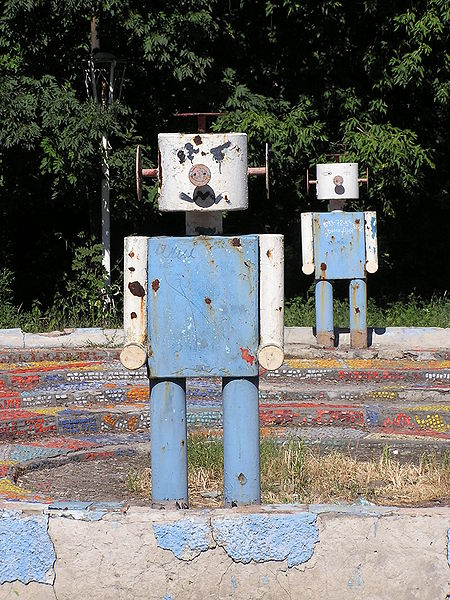
No publication birthed on the Internet is better than Aeon, a provocative stream of essays about technology, consciousness, nature, the deep future, the deep past and other fundamental concerns of life on Earth. In a world of brief tweets and easy access, the site asks the long and hard questions. Two great recent examples: Michael Belfiore’s “The Robots Are Coming,” a look at society when our silicon sisters no longer have an OFF switch; and Ross Andersen’s “Hell on Earth,” an examination of how infinite life extension will impact the justice system. (And if you’ve never read Andersen’s work about philosopher Nick Bostrom, go here and here.) Excerpts from these essays follow.
From “The Robots Are Coming”:
“Robots in the real world usually look nothing like us. On Earth they perform such mundane chores as putting car parts together in factories, picking up our online orders in warehouses, vacuuming our homes and mowing our lawns. Farther afield, flying robots land on other planets and conduct aerial warfare by remote control.
More recently, we’ve seen driverless cars take to our roads. Here, finally, the machines veer toward traditional R U R territory. Which makes most people, it seems, uncomfortable. A Harris Interactive poll sponsored by Seapine Software, for example, announced this February that 88 per cent of Americans do not like the idea of their cars driving themselves, citing fear of losing control over their vehicles as the chief concern.
The main difference between robots that have gone before and the newer variety is autonomy. Whether by direct manipulation (as when we wield power tools, or grip the wheel of a car) or via remote control (as with a multitude of cars and airplanes), machines have in the past remained firmly under human control at all times. That’s no longer true and now autonomous robots have even begun to look like us.
I got a good, long look at the future of robotics at an event run by the Defense Advanced Research Projects Agency (known as the DARPA Robotics Challenge, or DRC Trials), outside Miami in December. What I saw by turns delighted, amused, and spooked me. My overriding sense was that, very soon, DARPA’s work will shift the technological ground beneath our feet yet again.”
____________________
From “Hell on Earth”:
“It is hard to avoid the conclusion that Hitler got off easy, given the scope and viciousness of his crimes. We might have moved beyond the Code of Hammurabi and ‘an eye for an eye’, but most of us still feel that a killer of millions deserves something sterner than a quick and painless suicide. But does anyone ever deserve hell?
That used to be a question for theologians, but in the age of human enhancement, a new set of thinkers is taking it up. As biotech companies pour billions into life extension technologies, some have suggested that our cruelest criminals could be kept alive indefinitely, to serve sentences spanning millennia or longer. Even without life extension, private prison firms could one day develop drugs that make time pass more slowly, so that an inmate’s 10-year sentence feels like an eternity. One way or another, humans could soon be in a position to create an artificial hell.
At the University of Oxford, a team of scholars led by the philosopher Rebecca Roache has begun thinking about the ways futuristic technologies might transform punishment. In January, I spoke with Roache and her colleagues Anders Sandberg and Hannah Maslen about emotional enhancement, ‘supercrimes’, and the ethics of eternal damnation. What follows is a condensed and edited transcript of our conversation.
Ross Andersen:
Suppose we develop the ability to radically expand the human lifespan, so that people are regularly living for more than 500 years. Would that allow judges to fit punishments to crimes more precisely?
Rebecca Roache:
When I began researching this topic, I was thinking a lot about Daniel Pelka, a four-year-old boy who was starved and beaten to death [in 2012] by his mother and stepfather here in the UK. I had wondered whether the best way to achieve justice in cases like that was to prolong death as long as possible. Some crimes are so bad they require a really long period of punishment, and a lot of people seem to get out of that punishment by dying. And so I thought, why not make prison sentences for particularly odious criminals worse by extending their lives?
But I soon realised it’s not that simple. In the US, for instance, the vast majority of people on death row appeal to have their sentences reduced to life imprisonment. That suggests that a quick stint in prison followed by death is seen as a worse fate than a long prison sentence. And so, if you extend the life of a prisoner to give them a longer sentence, you might end up giving them a more lenient punishment.
The life-extension scenario may sound futuristic, but if you look closely you can already see it in action, as people begin to live longer lives than before. If you look at the enormous prison population in the US, you find an astronomical number of elderly prisoners, including quite a few with pacemakers. When I went digging around in medical journals, I found all these interesting papers about the treatment of pacemaker patients in prison.”


